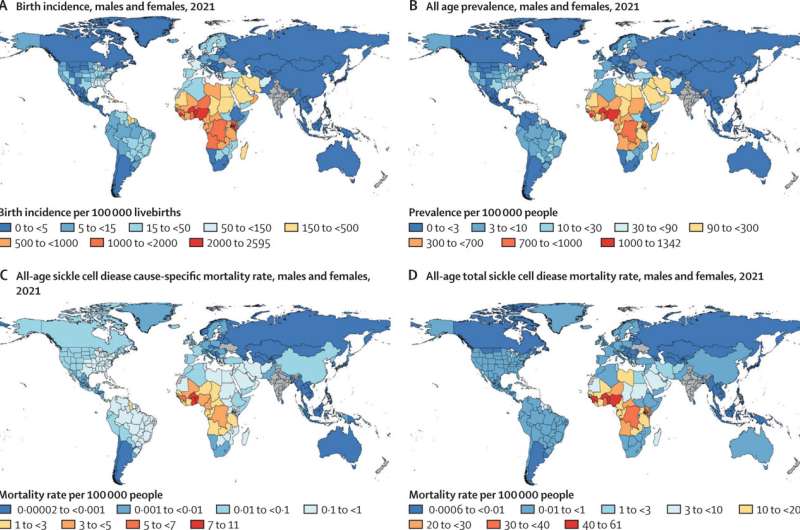This article has been reviewed according to Science X's editorial process and policies. Editors have highlighted the following attributes while ensuring the content's credibility:
fact-checked
peer-reviewed publication
trusted source
proofread
Basic levels of sickle cell care needed immediately; global mortality may be much higher than recorded

Reducing the burden of sickle cell disease (SCD) requires substantial financial and political commitment to improving dataccollection, diagnosis, treatment and training. Doing so will positively impact the lives of millions of patients and families worldwide—says a new Commission published in The Lancet Haematology journal.
The Commission publishes shortly after another study has provided the first estimates of the full global mortality burden of SCD, revealing a strikingly high contribution of SCD to all-cause mortality that is not apparent when each death is assigned to only a single cause. The study suggests there were 376,000 global SCD-related deaths in 2021, compared to 34,400 cause-specific deaths.
With over half a million babies born with SCD in 2021, the Commission highlights how newborn screening for SCD can lead to babies with the disease receiving life-changing treatment before symptoms develop and calls for all babies worldwide to be tested for SCD by 2025 to prevent long-term complications of the disease.
The Commission also shines a light on the unequitable treatment of SCD. Penicillin, methods to protect against malaria, the drug hydroxyurea and blood transfusions all have good evidence to show they reduce deaths and long-term consequences of SCD—however access and use of these treatments and reduction methods is poor, particularly so in low and middle-income countries where most people with SCD live. There is a shortage of healthcare and scientific professionals with expertise in SCD, as well as a lack of trials aimed at developing novel treatments. This problem is particularly severe in most of sub-Saharan Africa and India, and the Commission argues there is an urgent need for trials specifically designed for people in these countries.
The Commission says that in the context of increasing global inequalities, partly driven by racism, previous calls for action on SCD have been largely ineffective. There is an urgent need for all people with SCD to be given access to minimum specific health care no matter where they live and for funding programs for research in all aspects of SCD to be prioritized and increased.
Dr. Frédéric Piel, of the Imperial College London and chair of the Commission, says, "Whereas the majority of major causes of death are decreasing, the number of deaths due to sickle cell disease is increasing globally. The costs required to reduce the risk of sickle cell disease is beyond the reach of most individuals in sub-Saharan Africa and India where the disease is most prevalent—it needs to be directly funded by governments. With adequate engagement of governments, the changes identified in our Commission are achievable and will improve the lives of people with sickle cell disease throughout the world."
In a patient viewpoint published alongside the Commission, Lwimba Kasongo, a sickle cell disease patient and advocate from Zambia, says, "I grew up in a supportive family, but nothing could have prepared me for the stigma and mockery I experienced at school and as an adult. I lived in fear because I was told that I would not live long, I made no plans, and had no dreams or hopes for the future. In junior high school, I told my parents that I would not go to college as I thought I was going to die at age 16 years. I spent my teenage years isolated and with very little social life, as I was frequently in and out of hospital. I felt the pain of being different, added to the constant physical pain crises and the dependency on medicine and blood transfusions; I wondered why I was born and what the meaning of my life was."
More information: Azalea M Thomson et al, Global, regional, and national prevalence and mortality burden of sickle cell disease, 2000–2021: a systematic analysis from the Global Burden of Disease Study 2021, The Lancet Haematology (2023). DOI: 10.1016/S2352-3026(23)00118-7
Frédéric B Piel et al, Defining global strategies to improve outcomes in sickle cell disease: a Lancet Haematology Commission, The Lancet Haematology (2023). DOI: 10.1016/S2352-3026(23)00096-0

















